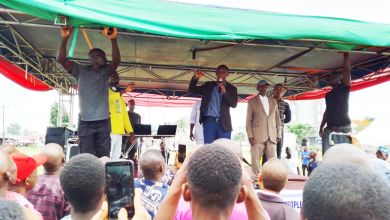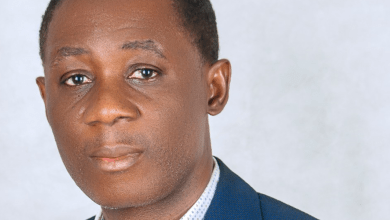Oil Subsidy Removal is Jonathan’s Achille Heel – By Leburah Ganago
Oil subsidy removal has become a recurring decimal in the economic or is it political, equation of successive Nigerian administrations; military or civilian. It is a bitter pill recklessly forced down the throat of Nigerians, every now and then, by their usually dubious rulers. In fact, every administration that comes to power removes oil ( petroleum) subsidy, so much so that one is beginning to wonder where the so-called subsidy is coming from since it is supposed to have been removed previously.
However, former Petroleum Minister Professor Tam David-West says the whole notion of petroleum subsidy is a ruse. Said Professor David-West : “ There is no oil subsidy in Nigeria. It is a lie and fraud. After the regime of General Buhari, I challenged government after government, from General Ibrahim Babangida and Chief Ernest Shonekan to General Olusegun Obasanjo and President Goodluck Ebele Jonathan, to appear on national television with me to justify their subsidy” . ( SaharaReporters, November 11, 2011).
Now, one of the arguments adduced by various Nigerian regimes for the case for oil subsidy removal is that the government loses money as it imports refined petroleum products into the country and sells them to the public below their production, that is, refining cost (abroad). This is their own definition of “subsidy ”.The other reason is smuggling of refined petroleum products-fuel and kerosene, across the border to neighboring countries. According to the government argument, refined petroleum products smuggled abroad are being sold at very high and profitable prices. This high profit margin serves as an incentive for intensive smuggling activities which creates artificial scarcity in the country. So the Nigerian government reasons that removing the so-called subsidy would increase the price of petroleum products in Nigeria , to leverage the prices in neighboring countries, thereby serving as a disincentive to smuggling. However, the government approach is a crude response to the smuggling problem. You do not increase the price of petroleum products and aggravating the already perilous economic situation in the country in the name of curbing smuggling . Government would do a better job of policing the nation’s borders to check smuggling without resorting to increase in prices of petroleum products.
In the first place, as argued by economic and industry experts, the Nigerian government has no business importing refined petroleum products. At various times Nigeria ranges from 8th to 6th petroleum producing countries in the world. There are currently four oil refineries in the country. According to Professor Tam David-West, the total production capacity of the four refineries is 445,000 barrels per day. He went on, “If the refineries are working even at 80 percent ,(capacity) we will have more than enough product”.
So why does the Nigerian government not take advantage of utilizing the full capacity of the nation’s four refineries to refine enough petroleum products to meet up local consumption?. Both Professors Tam David-West and Sam Aluko, contend that the fraudulent disposition of the Nigerian government is the reason they continue to resort to importing refined petroleum products rather than refining them at home.
The local refineries, they contend, are deliberately sabotaged by the well-connected fuel importation cartel. The fuel importation business in Nigeria is a particularly fraudulent and criminal enterprise which no responsible government should allow to continue. According to the former chairman of the National Economic and Intelligence Committee, Professor Sam Aluko, : “ The government , by choice exports the best crude oil in the world and imports the worst refined products” .
As revealed by Professor Aluko, the government awards fuel importation contracts to top military brass (serving and retired) and political bigwigs , who in turn sell the contracts or importations licenses to oil companies.
Paradoxically, in Nigeria, government actions have always ended up punishing the victims of the privileged criminals-the hapless law-abiding ordinary citizens. Is this a case of poor judgment on the part of President Goodluck Jonathan or a case of business as usual, the Nigerian way? Like Professor Aluko said “It is not the business of government to tell Nigerians that it is removing subsidy because if it is a cartel that gains from the importation of fuel, government should find a way to deal with the cartel, instead of taking a decision that will have far reaching effect on the masses.
In this discourse, I intend to hold President Jonathan to a higher standard ( above the Nigerian record). This is because President Jonathan has positioned himself as being different from members of the old order. Or there was unreasonably high expectation about him. He was seen as a transformational figure in an envisaged new political order in Nigeria. Perhaps, this explains why he was well embraced by the international community. However, so far President Jonathan has shown that he is no different from the old order of the Nigerian political class. Or he seemed overtly overwhelmed by the weight of the country’s myriads of problems- perennial sectarian violence which has snowballed into a full blown terror operation, now placing Nigeria in a similar universe as Iraq and Pakistan; endemic treasury looting, dilapidated infrastructure and poverty.
For a regime that is battling insecurity to unleash an economic war on the downtrodden Nigerian masses at this time is the height of naivety. The spike in the price of petroleum products-gasoline and kerosene, in particular will have serious economic and security ramifications for the country. The price of virtually all economic items-from transportation to food items will rise astronomically. Like I have noted earlier, this translates into more hardship for the generality of Nigerians’ except the looting politicians and the petroleum products importation cartel. And Nigerians are good at resorting to whatever means, including troubling ones , that are available to survive hardship. Before the oil subsidy was removed , there was already crude “refineries” existing in some parts of the oil producing areas which churn out adulterated products, with resultant loss of lives. These crude “refineries” are bound to escalate, with security implications, which the government will have to deal with.
The economic hardship which the removal of petroleum subsidy has caused is bound to compound the security crisis in the country. . Those who are bent on perpetrating violence in the country may hijack the on-going protests and make it bloody. Already, the Nigerian police have started spilling the blood of innocent protesters. I want to believe that this is not what President Jonathan who in spite of his missteps is generally seen as a gentleman, wants. The bloodbath being perpetrated by the Boko Haram terror group is already too much for the country to bear. And this new president’s reputation has already been tarnished.
At a time the administration is inflicting more economic pains on Nigerians through the ill-informed removal of petroleum subsidy, news, bad news, got out that President Jonathan has allocated nearly a billion Naira for himself and his vice president, as “feeding allowance” in the 2012 budget proposal. And this is said to have outraged Nigerians. So why should President Goodluck Jonathan seek to elevate his and his vice president’s level of comfort at a time he wants Nigerians to tighten their belts for more hardship? Is this a case of confusing signals or bad reading of the tide by the president?
More bad news for Nigeria, and President Jonathan in particular: A local Nigerian news source recently quoted an Indonesia source, The Indonesia Post, as reporting that the Nigerian government is negotiating an investment of N428.8 billion ( $2.68bn) in three refineries deal in Indonesia. According to the source, the Nigerian government plan aims to part-own three petroleum refineries . Under the proposed arrangement, the Nigerian government would export crude petroleum to Indonesian refineries, to be refined there and imported back into the country. This would do well to consolidate the oiling of the corrupt petroleum products importation pipeline. These would create more oil import contractors and more demand for removal of “oil subsidy” by the government. This is one case of shortchanging the long-suffering Nigerians too many. And it must be resisted.
Yet, a strange explanation from the Jonathan administration on why it is removing “oil subsidy”. The Guardian in its December 27, 2011 reported the Minister of Works, Mr. Mike Onolememen as having claimed that the government has already earmarked N600b of the proposed funds to be saved from subsidy removal for road construction. This report presupposes that the Nigerian government needs money to execute development projects . But this is not the case. The problem with the Nigerian government is that there is too much oil money to loot. The problem is that of impunity. Looters get away with their loots without having to face consequences. It is sheer lunacy for these PDP gangsters to think that the already shortchanged Nigerian masses must further be robbed in order to be provided with infrastructures. In fact, experience has shown that the more oil revenue is ,the greater the margin of treasury looting. In the 1990s government officials were looting in hundred of millions of Naira. These days they are looting in the hundreds of billions .
Talking of road projects, how many of the previous road construction contracts awarded by this administration has been executed? Again, our experience in Nigeria has shown that most of those road contracts were not meant to be executed but were meant as largesse for loyal party men who helped in one way or the order in rigging elections for the ruling party.
But why on earth should the Jonathan administration contemplate building or is it “part-owning” three oil refineries overseas instead of building same at home at a time they are talking about job creation? Is the Jonathan’s job creation plan starting abroad?. Is it a sound economic judgment for the Jonathan administration to part-own oil refineries overseas rather than building more of them at home, to take care of increasing demand of refined petroleum products and creating jobs for the local population?
Like industry experts and other well-meaning Nigerians including Professors Tam David-West and Sam Aluko have revealed that the only reason past administrations in Nigeria resorted to importation of refined petroleum products rather than making existing refineries in the country functional and building more of them here , is their corrupt disposition . The people in government and their fraudulent business partners make big money by deliberately crippling our oil refineries and continue importing refined products into the country.
President Jonathan may choose to redeem himself by making the existing refineries in the country function at full capacity and go on to build more oil refineries in the country; and end the criminal and fraudulent enterprise of fuel importation. This should settle the garbage talk of oil subsidy removal . There would be enough oil revenue to build new refineries, if only this administration can halt the treasury looting that is going on. Regrettably, President Jonathan has been unable to do anything to stop the looting spree which he inherited from his mentor and benefactor, former President Olusegun Obasanjo.
It could still be that President Goodluck Jonathan is good man with honest intentions for his beloved country who is surrounded by bad advisers. The other day Ijaw and South-South Movement leader Chief Edwin-Clark alleged that President Jonathan is being surrounded by saboteurs. And Professor Sam Aluko noted that former President Obasanjo, as a politician became prisoner of the PDP, which the renowned economist tagged “an evil party”. However, for his own personal reputation and for the sake of the vast majority of Nigerians who are going to be impacted by this misguided economic policy President Jonathan must extricate himself from his IMF World Bank advisers and his evil party and reverse his decision to remove oil subsidy. If the issue is more revenue for the government like they would have us believe, President Jonathan has a better option than inflicting more pains on Nigerians. He should be able to recover the trillions of dollars of our looted funds ,from past and current public officeholders, beginning from at least, the Babangida days. What we need is restitution not further exploitation of the poor and the weak.
Until we produce a president who is honest and courageous enough to take on the bad guys and end the free-for-all looting of our states and national treasuries, we may never have a future or country. May be, we needed a president Buhari.
Leburah Ganago
Atlanta, Georgia
United States




